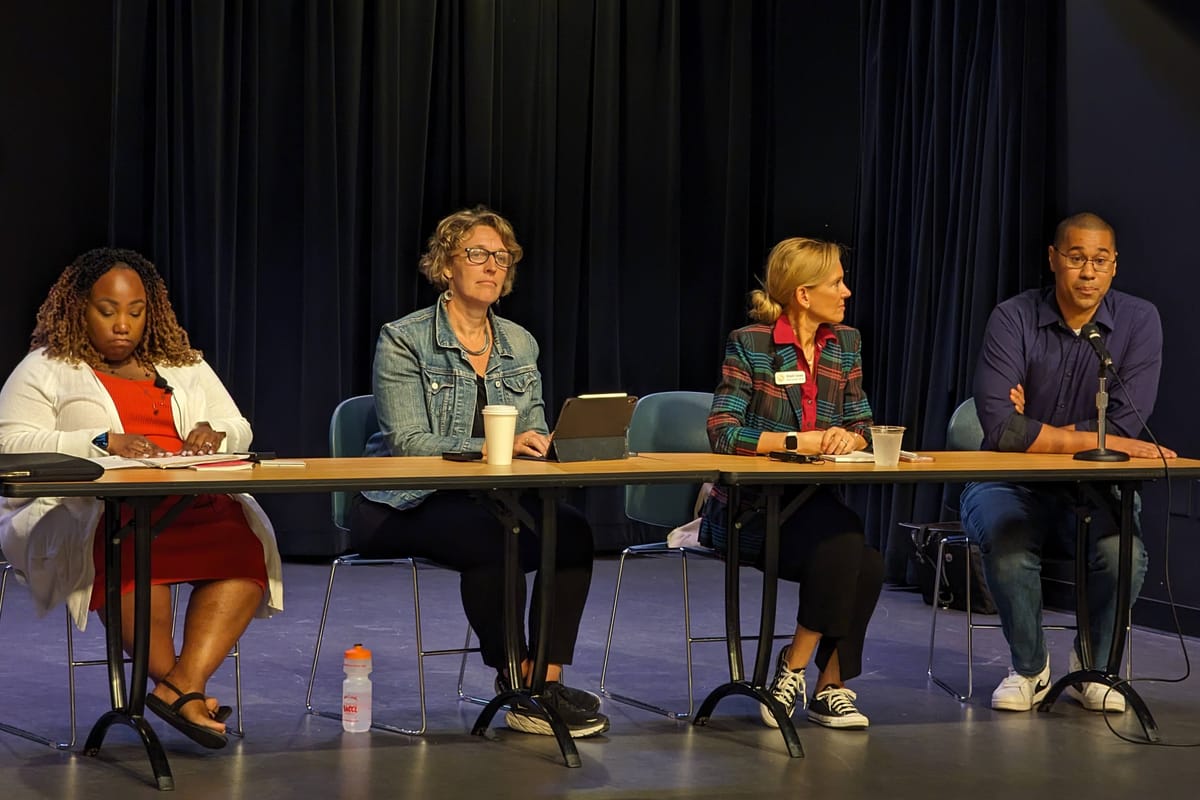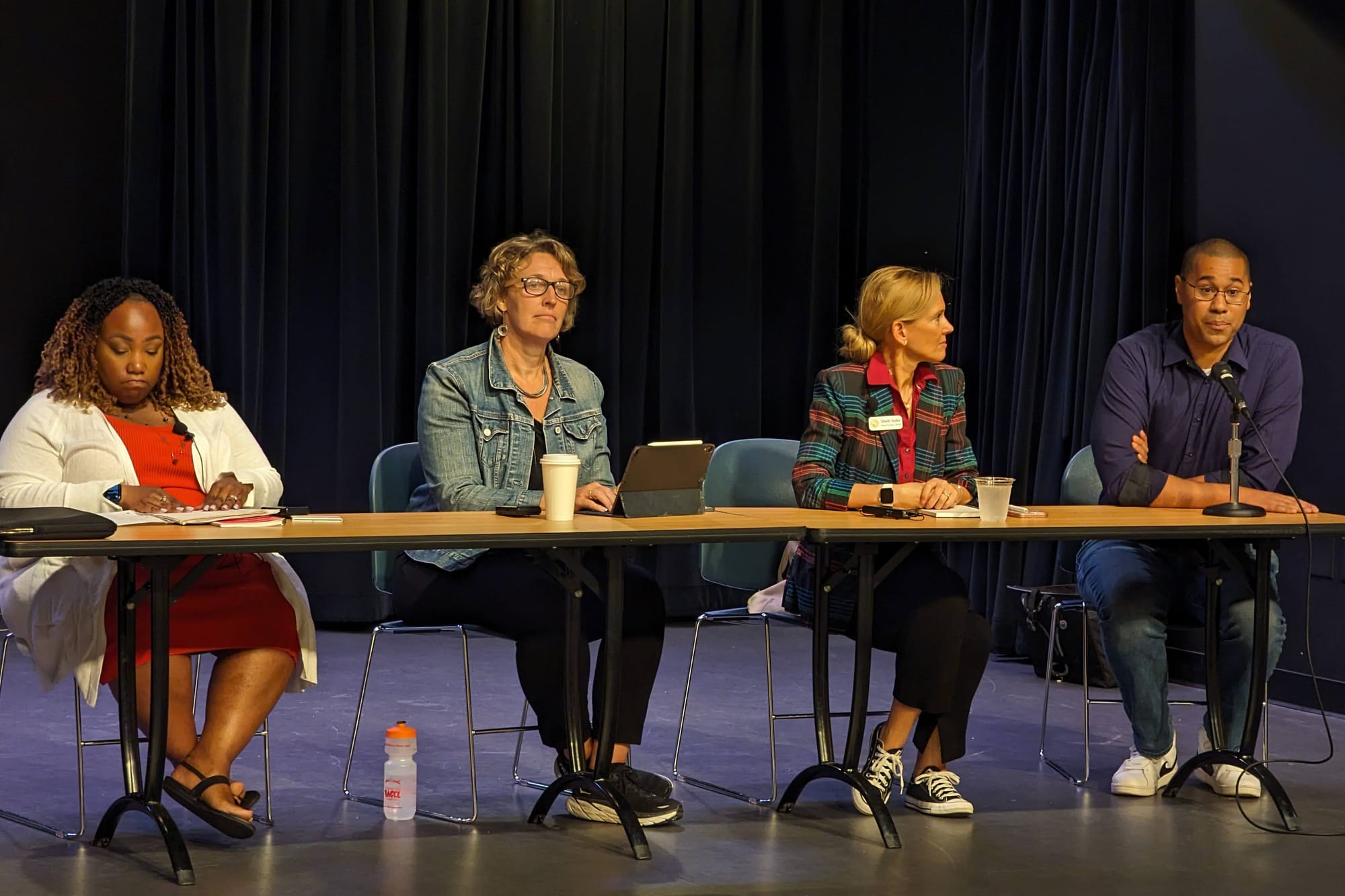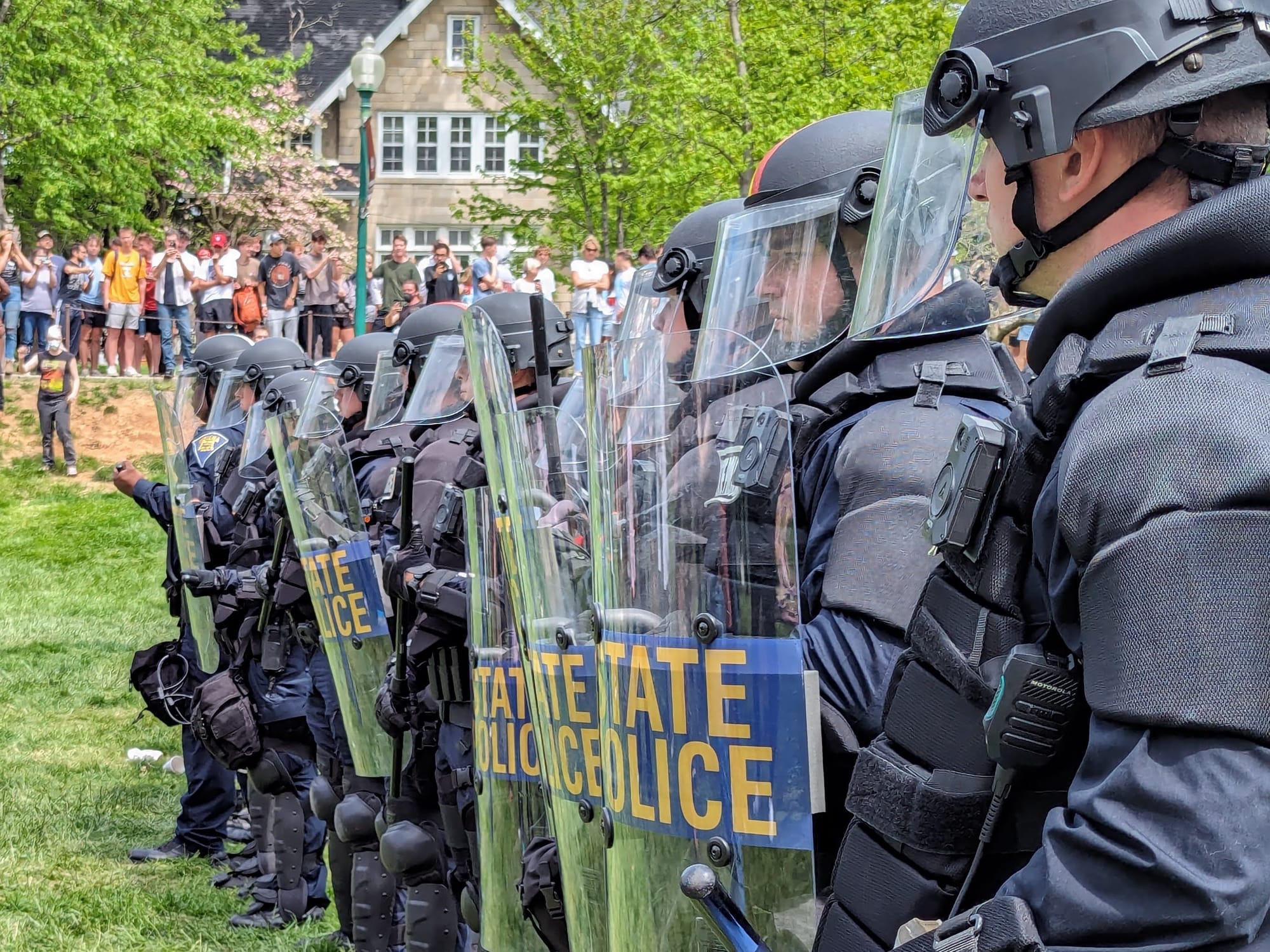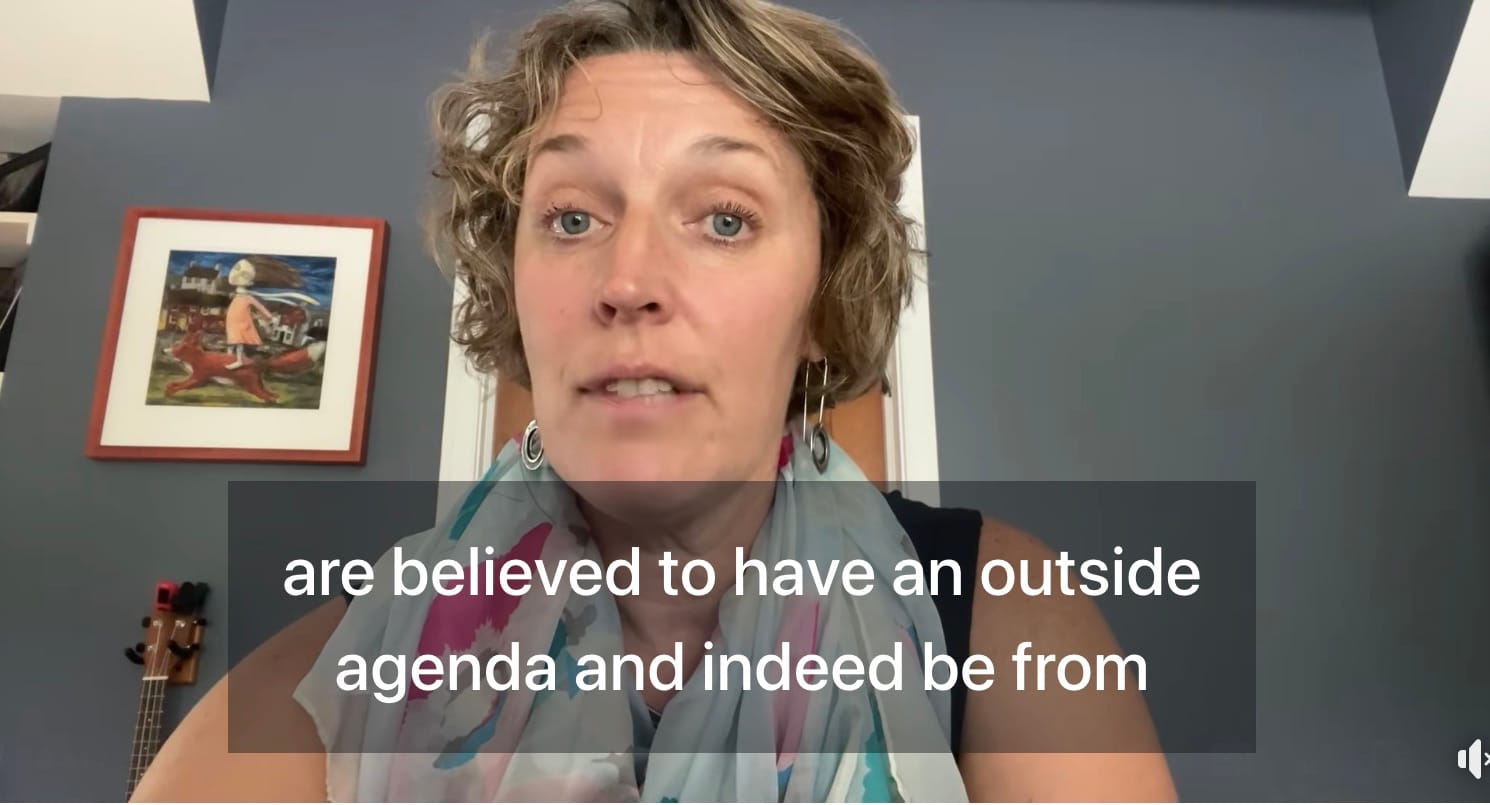Bloomington mayor after state police remove Gaza protest tents on IU campus: ‘I’m not supportive of unauthorized encampments, nor of violence.’




In a video message released at 4:17 p.m. on Saturday, Bloomington mayor Kerry Thomson took a position on the recent state and university police action on the Indiana University campus, which has seen the arrest of 55 protestors, including both faculty and students, on two separate days.
In Thomson’s message, which lasted about three minutes, she said, “I’m supportive of the protesters and their freedom to express themselves.”
She continued, “I’m not supportive of unauthorized encampments, nor of violence.” Thomson added: “I urge all involved to use the principles of non-violence and de-escalation and to be aware that these times are already charged for so many. ”
The demonstration, against the killing of civilians in Gaza by the Israeli army and in support of Palestine as a state, included some tents and pavilions set up on Dunn Meadow. It’s a spot with more than 50 years of tradition as a location for political protest.
Up until this past week, the right to use any “sign, symbol or structure” as part of a demonstration was ensconced in a university policy enacted in 1969.
In her video message, Thomson twice used the word “unauthorized” to describe the tents in Dunn Meadow that were the stated basis for police action on Thursday and again on Saturday.
Thomson’s use of the term “unauthorized” stems from a change to the half-century-old policy by Indiana University president Pamela Whitten’s administration, the day before last Thursday’s demonstration. It’s a change that has been subjected to sharp criticism for not following the principles of shared governance of the university.
In Saturday’s video message, Thomson also raised the specter of outsiders who might be taking advantage of the demonstrations about Gaza that have sprung up on college campuses across the country.
In her video message, Thomson said: “What’s happening in Dunn Meadow currently is part of a national movement on college campuses, and it has attracted some who are believed to have an outside agenda and indeed be from outside of our community,” Thomson added, “These agendas are known to be less than peaceful.”
A CNN piece, published on Saturday, scrutinizes the “outside agitator” narrative in connection with the Gaza protests that are taking place nationwide.
[Updated at 10:55 a.m. on April 28, 2024. Thomson issued a mid-morning news release on Sunday, April 28, 2024, apologizing for one of the statements she made in her video message the previous day. Her followup statement reads in part:
Bloomington, I’m coming to you today with an apology. I see now that my statement yesterday was less than clear, and that one statement in particular was harmful. When I ran for office I committed to listening hard, and to admitting when I am wrong.
In my message about the protests yesterday, I made a statement about the presence of outside groups. We had reports of Proud Boys and other involvement, and I had concern about the possibility of escalation beyond what our students and faculty present on campus were gathered to achieve. This statement, I see now, pointed the finger in the way I had not intended. I am sorry.
Thomson’s complete followup statement has been uploaded to BloomDocs.org.]
Also on Saturday, starting at 10:30 a.m. which was a couple hours before that day’s police action took place, Thomson participated in a town hall with some other elected officials. In her turn to make introductory remarks, Thomson took up the topic of the arrests on campus two days earlier, which she called “the elephant in the room.”
In her town hall remarks, Thomson did not use the word “unauthorized” to describe the protest tents as she did in her video message. In her town hall remarks, Thomson also did not refer to the potential of outside actors being involved in the IU campus protests.
In her town hall remarks, Thomson’s main point was the fact that Bloomington police were not a part of the law enforcement action on campus.
Thomson said, “Our police have not been involved on the IU campus.” Thomson confirmed to the B Square after the town hall that she had asked Bloomington police not to be involved.
Thomson told the town hall audience, “We will only be there, if there is an extreme safety issue that happens, that necessitates backup.” Thomson continued, “We will not be advancing on free speech. We will not be advancing on protesters.”
In her remarks made to the town hall audience, Thomson reported that she has talked to Indiana University president Pamela Whitten. Thomson said, “[Whitten] is committed and gave me her word, that they are going to continue to dismantle the encampment—but protesters are allowed. And she will be supporting the free speech.”
Thomson continued, saying, “I have been in hourly conversations with our police—they are also committed to de-escalation and conversation before any force. And they have a principle of not being up there as well.”
The town hall, which took place in the downtown location of the Monroe County Public Library, a few blocks from Dunn Meadow, was hosted by Thomson, state senator Shelli Yoder, Monroe County councilor Jennifer Crossley, and Bloomington councilmember Isak Asare.
The town hall panel drew a sharp question from an Indiana University student. The question, with its preamble, was effectively an invitation to the four elected officials to call for IU president Pamela Whitten’s resignation:
A few weeks ago, the Whitten administration had a faculty vote of no confidence of 93 percent. Ninety-three percent of her employees said she should go. Following that, students, with their voices, went out and protested peacefully. And in response, she sent the Indiana State Police. She sent snipers on top of the IMU, to target those students, and riot police to beat them down. Now we can say that the city had no responsibility.
So the question is: Is Whitten in charge of the city? Does she get to control what happens to half the population? And are we just subject to this rogue administration that no one wants? And that clearly is not in favor of free speech, as the night before that protest, she goes and changes the rules that does not at all listen to the faculty or the council—she suspends professors when she wants. It is clear that she’s just doing what the IU Board of Trustees wants, and all the donors want, and that we’re all just helpless victims who have to suffer the fascist crackdown.
And so I guess my question is: Are we going to just release statements that we’re concerned? Or are we going to call for her resignation, like everyone at IU has?
None of the four elected officials at the town hall accepted the invitation to call for Whitten’s resignation.
Responding to the question, Asare led off his remarks with the fact that he is an IU faculty member. He’s assistant dean for undergraduate affairs and co-director of the cybersecurity and global policy program at the Hamilton Lugar School of Global and International Studies.
At the town hall, where he was present as a Bloomington city councilmember, Asare said that his university affiliation meant that he was wearing “two hats.”
Here’s what Asare said:
Let me just first speak from my city hat. This is a college town. Fifty percent of our population are students. And anything that puts the well-being of our students, and the safety of our students, the rights of our students at risk, is something that not only are we concerned about, but we all took oaths of office to protect the Constitution and the people of this town, and that includes the students. And so I share your deep concern about the ways that we’ve responded to the peaceful protests that are happening, regardless of whether we agree or disagree with what they’re protesting about.The reality is they have every right to do it. And maybe it hasn’t been handled well.
But your question about whether or not President Whitten controls the city? Well, the answer is that the university does have its own governance structure.
With both my hats on, the core issue is whether or not that governance structure has been obeyed. And that’s something we can maybe debate at another time. But I mean, we are doing what we can within our power to effect change and protect the students, and faculty and staff, etcetera. But, you know, I think there are some limits to that.
Thomson followed Asare by saying, “He said it well.” She added, “It is within their jurisdiction, they have their own police department, and when their police department calls in a higher level of policing, then they have the right to do that.”
By then, the town hall had reached its scheduled endpoint of 11:30 a.m., and Crossley and Yoder did not comment on the specific question.
The topic of Gaza will be in front of the city council again on Wednesday (May 1) when the meeting agenda will include a vote to override Bloomington mayor Kerry Thomson’s veto of a Gaza-related resolution, which the council passed 9–0 on April 3. The resolution called for a ceasefire so that humanitarian aid could be delivered.
The city will also be taking up the topic of encampments this next week—not any involving Gaza protests, but rather those that have been established simply as a place to live, near the south end of Switchyard Park. Thomson’s administration has indicated that May 1 is the day when those encampments will be cleared, and service providers have been working to find some place to go, for those who are camping there.




Comments ()